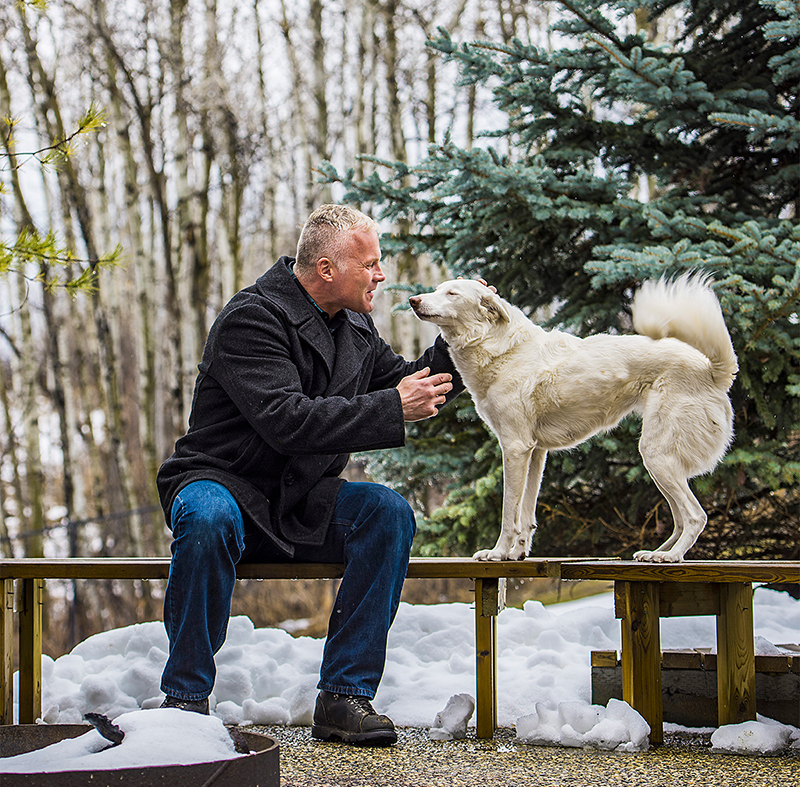Spencer Sekyer looks for teachable moments. Wanting to set an example for his students in Sherwood Park, Alta., the high school social studies teacher and former University of Alberta Golden Bears linebacker began travelling the world, particularly to developing and war-torn countries, to teach and volunteer during his vacations. He wanted to learn more about the world and to make a difference. Sekyer's passion for helping children and animals grew with each trip. In 2010, he rescued seven dogs from the streets of Kabul, Afghanistan. Most recently, Sekyer rehomed a baby chimp named Manno from a zoo in northern Iraq.
You have a real passion for animals. What do they mean to you? My first two dogs, Mac and Chloe, warmed my heart to the animal kingdom. I think of the quote by Gandhi: "The greatness of a nation and its moral progress can be judged by the way its animals are treated." People around the world are in difficult situations, so animals aren't always treated the best. But when I travelled, I had a soft spot and would care for animals I came across.
Like Manno the chimp. How did you meet him? In December 2013, I travelled to Kurdistan to volunteer with Kurdistan Organization of Animal Rights Protection. The first time I met Manno, he was running loose at the [Duhok Zoo's] candy store, ripping apart bags of sunflower seeds. [The zookeeper] let me hold him and I felt an incredible bond. Then I found out he was being kept in a small birdcage most of the time. I felt a little niggle, like a pebble in my shoe. Something just didn't sit right with me. I emailed legal authorities, wildlife foundations and non-governmental organizations. Ultimately, one of those connections was the catalyst to Manno's rescue.
You met primatologist Jane Goodall at an event in Edmonton. How did that change things? I showed her a picture of Manno, gave my spiel and her eyes lit up. She connected me to her team and they got me in touch with Sweetwaters Sanctuary in Kenya. In November 2016, Manno moved to the sanctuary. It's the perfect place: he is fed every day, has access to vet care and acres of forest to roam in. He was released from quarantine in March and began the integration process into the chimpanzee group.
How did you go from teacher to activist? It's funny how the world works. I was teaching phys-ed and coaching, but that had run its course. I wanted to teach social studies but speak from experience, like I could with athletics. I researched countries where I could teach during my summers off. The first place I heard from was a school in Freetown, Sierra Leone. I travelled there in the summer of 2008; it was an eye-opener and [that trip] started everything. I used all my holidays for the next five years teaching in developing countries.
How have your students reacted to stories of your adventures? One of my former students contacted me on Facebook to tell me he was travelling to the Central African Republic to volunteer at an orphanage. You never know how what you say, think or do can affect people and maybe plant a seed or inspire a student who will go on to do great things.
What advice do you have for people who want to make a difference? If you see something you don't think is right, step up. Don't think, 'Somebody should do something.' You're somebody. It may seem like you can't get something done, but if you set your mind to it and stick with it, it will happen.
This interview has been edited and condensed.

We at New Trail welcome your comments. Robust debate and criticism are encouraged, provided it is respectful. We reserve the right to reject comments, images or links that attack ethnicity, nationality, religion, gender or sexual orientation; that include offensive language, threats, spam; are fraudulent or defamatory; infringe on copyright or trademarks; and that just generally aren’t very nice. Discussion is monitored and violation of these guidelines will result in comments being disabled.